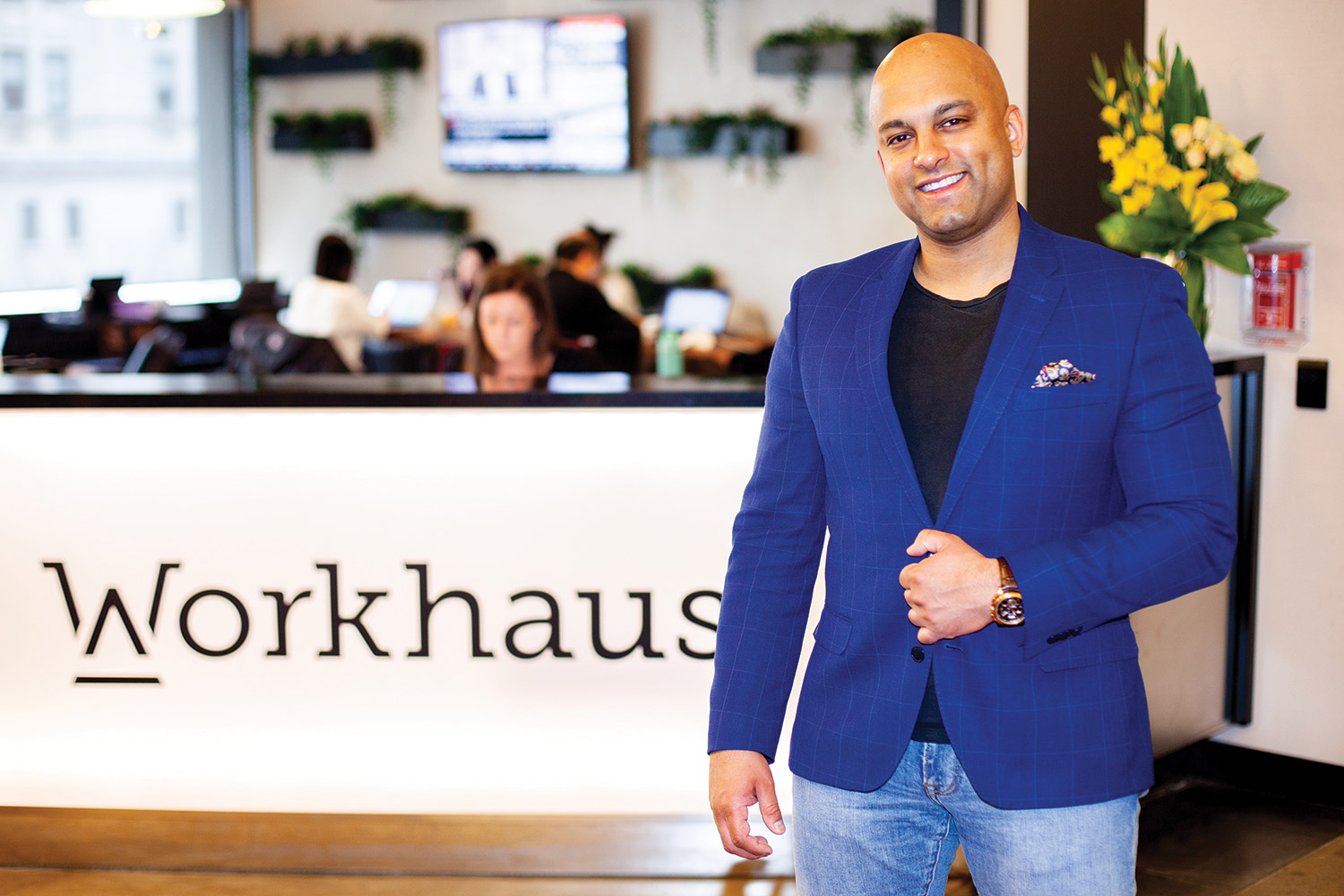
Workhaus
One day in June five years ago, Adrian Joaquin went hunting for, of all things, a desk. Joaquin, a chiropractor turned entrepreneur from Toronto, had till then been toiling day and night to launch his own business, a health-care startup. But when things didn’t work out, Joaquin thought about what to do next. Maybe consulting. Or another new venture. Either way, he needed a place to start. That’s where the desk came in.
“What I really wanted was a place to figure out my next move,” he says. “I wanted to rent a desk, a shared space. I was looking for something that was professional enough that I could bring clients there, but that was social, so I could develop a network.” Joaquin scoured Toronto for just such a spot. No luck. Every place he checked out was either too corporate or too casual.
Joaquin was mystified. Surely other people were looking for the same kind of shared office space he had in mind. Maybe, Joaquin thought, he should open such a place. Maybe this was his next move. Workhaus was born.
Mimosa Monday
Workhaus is not your typical office-for-rent. Rather it’s a “co-working space” whose users range from small startups looking to grow, to Fortune 500 companies in need of temporary extra room. Workhaus calls its users “members” and they can rent a desk or various-sized private offices. There’s also a hot-desk option – no reserved seat but access to Workhaus’ open-concept, coffee-shop-style lounges. Members get everything they need to run their business: Wi-Fi, mailing address, boardroom space, printing, coffee and someone at the front desk to greet clients.
Joaquin opened the first Workhaus in an 8,000-square-foot office near Toronto’s St. Lawrence Market in January 2015. Two years later a second location was added. Today, there are eight Workhaus spaces in Toronto, one in Calgary and one in Kitchener-Waterloo in Ontario. All in all, the company oversees 200,000 square feet of office space.
Workhaus is home to some 300 companies. They range in size from one-person outfits to teams of 50 to 100 people or more. The average company has four to five people. Workhaus itself employs around 20. Joaquin, who earned his Executive MBA Americas degree (a partnership between Queen’s and Cornell University) in 2012, is the CEO.
So why do firms use Workhaus? Flexibility is a big reason. Workhaus offers month-to-month leases rather than years-long rental commitments. “If you’re a startup in the early stages, you don’t know how fast or not you’re going to grow,” says Joaquin. “We offer that ability to grow with you. We have one company with us that started with one person at one desk four years ago; now he’s scaled up to 30 people with a few offices in our space.” Corporations, meanwhile, sometimes require extra space for teams working on projects. “They may only need to be there 18 to 24 months. Well, in Toronto you can’t get a lease for that; leases are five to 10 years.”
Another appeal is a community atmosphere – something Workhaus deliberately cultivates. One way is through fun events (a mini-putt social and “Mimosa Monday” were recently held) and workplace education sessions with titles like “Fundraising 101 for Entrepreneurs” and “JavaScript Coding for Beginners.”
That club feel
Tellingly, Joaquin does not consider Workhaus to be a real estate company. “We’re a hospitality company,” he says. Each Workhaus location employs a community manager who, in addition to day-to-day operations duties, is like a ship’s cruise director, organizing events and ensuring Workhaus members connect with one another.
To further encourage people to meet, Workhaus designs each location around a lounge. Members must walk through it to get to their office, says Joaquin, and these lounges are often bustling spots full of coffee and conversation. “You can rent space anywhere. But if you have 20 friends around you where you rent a desk, you’re less likely to leave. We like to have that member/club feel.”
That strategy seems to be working. Four more Workhaus locations are set to open over the next six months in Toronto, and Joaquin expects to double his own number of employees to 40.
Joaquin and a business partner have, to date, grown Workhaus themselves, without help from angel investors and the like.
One interesting thing Joaquin has noticed about Workhaus’ business model is that it seems to do well in any economy. In booming Toronto, where downtown commercial vacancy rates are around two per cent, Workhaus space is near capacity. In oil-bust Calgary’s core, where Workhaus opened this year, and where the vacancy rate is around 30 per cent, Joaquin says “we’re getting lots of interest because of the flexibility we have for businesses.”
